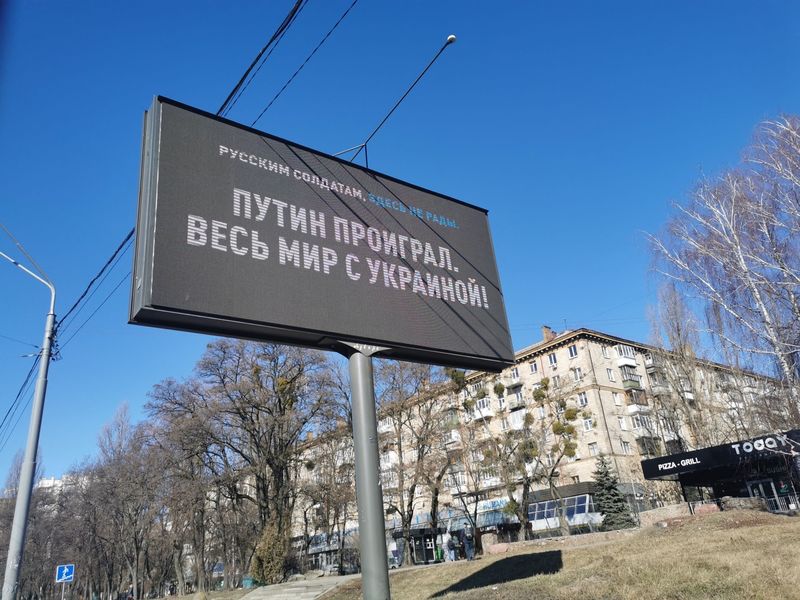Russia’s invading troops must listen to people exactly like them swearing at them in their language as the worst kind of uninvited guests.
Opinion: By Leonid Bershidsky, Bloomberg

At last weekend’s enormous pro-Ukraine demo in Berlin, my wife, our older daughter and I were drifting slowly through a crowd of protesters opposite the Russian embassy on Unter den Linden. An English-speaking woman next to us was trying to understand what the crowd was chanting. “Russky voyenny korabl, idi nakhui,” she repeated hesitantly to her companion. She shouldn’t have worried: She had a good ear for languages. “Putin khuylo! What are they saying?”
The companion, a tall young man, looked a little shamefaced. “These are curse words,” he mumbled. “But there’s more to them than that,” he added with more conviction.
That’s one way to put it. The first of the two phrases is legendary now — the graphically dismissive response of a Ukrainian border guard on Snake Island near Odesa to a radioed surrender demand from a Russian warship. The border guard and his comrades ended up in Russian captivity on Day One of the war, but their fearlessly blunt words became a battle cry and even made it into an inspirational video posted on President Volodymyr Zelenskiy’s official Telegram channel.
The other chant is much older: Ukrainian soccer fans have long used it to express their contempt for the Russian dictator. Now, we were yelling it at the Russian embassy’s tightly curtained windows. It felt surreal, and it didn’t really lighten the horrible burden we bear as Russians who side with Ukraine in this conflict that our native country has started, should never have started. But screaming out the words still felt right.
If you follow the Russian invasion of Ukraine closely, you’re bound to hear a lot of cursing. It’s in nearly every video, staged or spontaneous, filmed by Ukrainian soldiers or civilians, recorded in Russian or Ukrainian — people curse with abandon, spewing expletives as naturally as breathing. I don’t think I’ve heard as much foul language in my entire life as I have since Thursday.
As the late Ukrainian linguist Lesya Stavytska wrote in her book on Ukrainian obscenities, “Ukrainian Without Taboos,” using these words signifies “trying to come to terms with the world’s disharmony, injustice, unpredictability and, ultimately, its indifference, trying to turn this ontological norm of being on its head.” That makes sense in wartime — but the curse words also become powerful fighting words.
“Cursing and scatology help overcome fear during military action,” wrote Russian psycholinguist Vladimir Zhelvis. “World War II veterans say that as they attacked, Russian soldiers didn’t yell ‘For the Motherland! For Stalin!’ but just the traditional ‘Hurrah!’ followed by everyday curse words.”
These days, it’s Russian soldiers who hear Ukrainians curse in hatred, despair, red-hot anger. They get the same words they themselves would use hurled as them like stones ripped out of a pavement — for the two languages, Russian and Ukrainian, use, for the most part, the same expletives, rooted in their common Slavic linguistic past. Some Ukrainian nationalist ideologists, such as author Larisa Nitsoi, have made the case in recent years that it’s Russians alone who need a soapy mouthwash, that the common words are alien to the more European Ukrainians. The war has proven them wrong — Ukrainians’ cursing can send chills down a Russian spine or sharpen the ever-present sense of shame as their shaky mobile phone cameras scan the devastation of a fratricidal war.
I can only imagine what Russian troops feel when they hear the familiar obscenities from locals kicking and spitting at their vehicles, asking them why they’d come, telling them to get the hell out. It’s apparent by the sixth day of the war — and military analysts are largely in agreement about it — that the invasion’s foot soldiers likely weren’t told ahead of time where they were going and what would be expected of them. No normal Russian would voluntarily go and kill Ukrainians, soldiers or civilians. The common Russian-Ukrainian expletives, which they get in lieu of flowers as they pass through a village in a convoy or try to occupy a town, must sear their ears now.
One can talk about the Russian military’s strategic and tactical blunders, their logistical problems, their commander-in-chief Vladimir Putin’s catastrophic delusions — there would be truth to all this. But if I were sent to Ukraine as a 20-year-old contract soldier, I know what would be the worst for me: People who are exactly like me cursing me in my language as the worst kind of uninvited guest.
It feels horrible even though I’m not there and not wearing a Russian uniform. It feels right to shout out the curses that have turned into battle cries — but it also feels hollow because these are not my words now; they are part of the language of a more passionate, more righteous people.
Perhaps a people doomed to military failure, who knows — but one already victorious.
